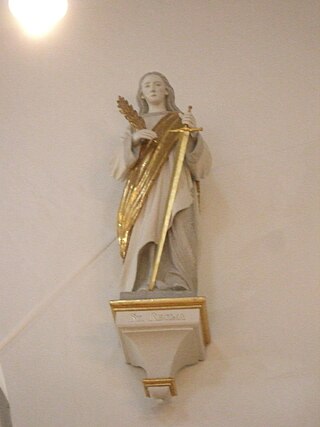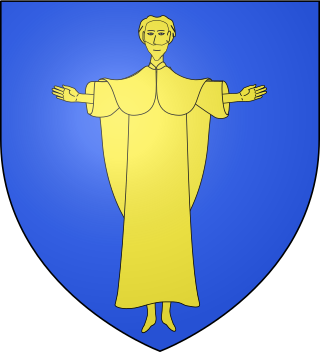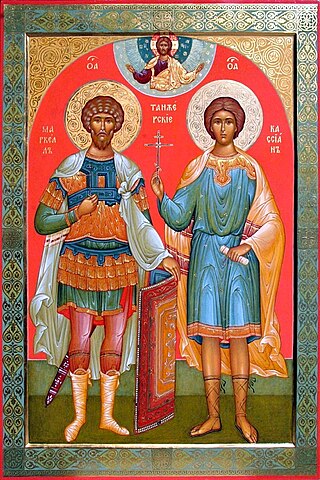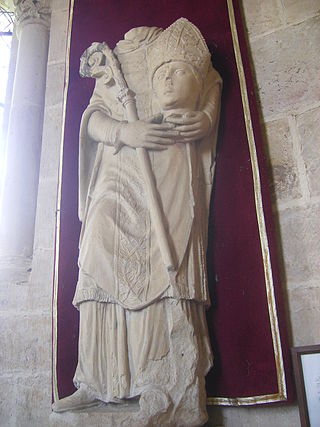Cassian may refer to:
Cassian may refer to:
Vincent of Lérins was a Gallic monk and author of early Christian writings. One example was the Commonitorium, c. 434, which offers guidance in the orthodox teaching of Christianity. Suspected of semi-Pelagianism, he opposed the Augustinian model of grace and was probably the recipient of Prosper of Aquitaine's Responsiones ad Capitula Objectionum Vincentianarum. His feast day is celebrated on 24 May.
Saint Thomas or St. Thomas may refer to:

Cassian, or Saint Cassian of Imola, or Cassius was a Christian saint of the 4th century. His feast day is August 13.

Saint Regina was a virgin martyr and saint of the pre-schism Christian Church. Regina was born in Autun, France, to a pagan named Clement. Her mother died at her birth and her father placed her with a Christian nurse who baptized her. Regina helped out by tending the sheep. She communed with God in prayer and meditated on the lives of the saints. At the age of fifteen, she was betrothed to the proconsul Olybrius, but refused to renounce her faith to marry him, for which she was tortured and was beheaded at Alesia in the diocese of Autun, called Alise-Sainte-Reine after her.

August 12 - Eastern Orthodox liturgical calendar - August 14

October 1 - Eastern Orthodox liturgical calendar - October 3

Saint Pantaleon, counted in Western Christianity as among the Fourteen Holy Helpers of the Late Middle Ages, and in Eastern Christianity as one of the Holy Unmercenary Healers, was a martyr of Nicomedia in Bithynia during the Diocletianic Persecution of 305 AD.

The Abbey of Saint-Victor, Marseille is a former abbey that was founded during the late Roman period in Marseille in the south of France, named after the local soldier saint and martyr, Victor of Marseilles.
Saint Reticius was a bishop of Autun, the first one known to history, according to the Catholic Encyclopedia. He was a Gallo-Roman, and an ecclesiastical writer, and served as bishop of this see from around 310 to 334 AD.

Symphorian, Timotheus (Timothy), and Hippolytus of Rome are three Christian martyrs who, though they were unrelated and were killed in different places and at different times, shared a common feast day in the General Roman Calendar from at least the 1568 Tridentine calendar to the Mysterii Paschalis. While still a young man, Symphorian was either beheaded or beaten to death with clubs.
Thecla, Tecla, or its variants is a Greek feminine given name made famous by Saint Thecla, a 1st-century Christian martyr.

Andeolus or Andéol is an alleged Christian missionary martyred in Gaul.
Nectarios, Nektarios or Nectarius is a Greek male given name encountered in Greece and Cyprus. It means "of nectar". Although its etymology refers to the word νέκταρ, the name Nectarios was never used in ancient Greece. It can be first seen no later than 300 AD as a Christian name, mainly of monks and bishops, in 20th century it became renowned in the Orthodox world by the lives of Saint Nectarios of Aegina and Venerable Nectarios of Optina.

Saint Cassian of Tangier was a Christian saint of the 3rd century. He is traditionally said to have been beheaded on 3 December, AD 298, during the reign of Diocletian. The Passion of Saint Cassian is appended to that of Saint Marcellus of Tangier and his saint day is celebrated on 3 December.
Saint Cassian of Autun was a 4th-century bishop of Autun. He may have been an Egyptian by birth. He traveled to Autun and was a follower of Saint Reticius, bishop of Autun.
Saint John or St. John usually refers to either John the Baptist or John the Apostle.

August 21 - Eastern Orthodox liturgical calendar - August 23
Valerie is generally a feminine given name, derived directly from the French Valérie. Valéry or Valery is a masculine given name in parts of Europe, as well as a common surname in Francophone countries. Another, much rarer, French masculine form of the name is Valère.

Saint Reverianus of Autun was a 3rd-century bishop of Autun and martyr. He is venerated as a saint by the Roman Catholic Church. According to tradition, Reverianus was of Italian origin, he was sent by Pope Felix I to evangelize the Aedui, a Gallic people of Gallia Lugdunensis and is considered the "apostle of the Morvan".
Sœur de La Chapelle was a French nun in the second half of the 17th century who wrote a tragedy about the martyrdom of Saint Catherine of Alexandria.